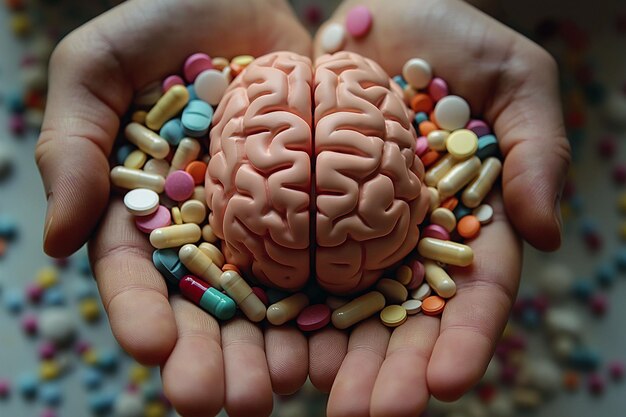Table of Contents
Nootropics, often called “smart drugs,” are substances used to enhance mental performance, including focus, memory, and clarity. Their popularity has surged among students, professionals, and health enthusiasts looking to boost productivity or manage cognitive challenges.
However, with this rise in usage comes an important question: Are nootropics addictive? While some nootropics are known for their low risk of dependence, others, particularly synthetic or stimulant-based options, may carry addictive potential. In this article, we’ll explore the nature of nootropics, their potential for addiction, and how to use them responsibly to reap their cognitive benefits without harm.
What Are Nootropics?

Nootropics, commonly referred to as “smart drugs” or cognitive enhancers, are substances designed to improve mental performance. These compounds work by influencing brain functions such as neurotransmitter activity, blood flow, or cellular protection, resulting in enhanced focus, memory, creativity, or mood stability.
Types of Nootropics
Nootropics can be categorized into two main types:
1. Natural Nootropics
Derived from plants, foods, or other natural sources, these nootropics are generally considered safer with fewer side effects. Examples include:
Caffeine: A widely used stimulant that boosts energy and alertness.
L-theanine: Found in tea, it promotes relaxation and enhances focus, especially when paired with caffeine.
Omega-3 Fatty Acids: Essential for brain health, they improve memory and mood.
Natural Nicotine: Found in products like Nic Nac Naturals, it enhances focus and clarity in controlled doses.
2. Synthetic Nootropics
Created in labs, these compounds are designed for specific cognitive benefits but may come with higher risks or unknown long-term effects. Examples include:
Modafinil: A stimulant used for wakefulness and focus.
Racetams: A class of synthetic compounds like Piracetam, known for enhancing memory and learning.
Common Uses of Nootropics
People use nootropics for a variety of reasons, including:
- Focus: Improving attention during work or study.
- Memory: Enhancing recall and learning capabilities.
- Stress Management: Stabilizing mood and reducing anxiety.
- Productivity: Boosting energy and mental clarity to handle demanding tasks.
While nootropics offer diverse benefits, their potential for addiction varies significantly based on the type and usage patterns, making it essential to understand their risks and limitations.
What Does It Mean to Be Addictive?

Addiction is a complex condition characterized by a compulsive need to use a substance despite its potential negative consequences. It typically involves two key components: physiological dependence and psychological dependence.
Physiological Dependence
This occurs when the body adapts to a substance and requires increasing amounts (tolerance) to achieve the same effects. Stopping use can lead to withdrawal symptoms, such as headaches, fatigue, or irritability. For example, caffeine, a common nootropic, may cause withdrawal symptoms in frequent users.
Psychological Dependence
This refers to the mental reliance on a substance to perform specific tasks or achieve desired states, such as focus or relaxation. A person may feel they cannot function optimally without the nootropic, even if there are no physical withdrawal symptoms.
Factors Contributing to Addiction
- Reinforcement: The substance provides immediate, rewarding effects, encouraging repeated use.
- Frequency and Dosage: Regular, high doses increase the likelihood of dependence.
- Individual Vulnerability: Genetic predispositions, stress levels, and mental health conditions can heighten addiction risks.
Low-Risk vs. High-Risk Substances
- Low-Risk Nootropics: Compounds like omega-3 fatty acids and L-theanine are not addictive due to their non-stimulant nature and lack of tolerance or withdrawal effects.
- High-Risk Nootropics: Substances like caffeine or nicotine can lead to dependence if overused, although controlled forms, such as Nic Nac Naturals, reduce these risks significantly.
Understanding these distinctions is crucial to assessing whether a particular nootropic poses a genuine risk of addiction.
Are Nootropics Addictive?

The potential for addiction in nootropics depends largely on the specific compound, its mechanism of action, and how it’s used. While many natural nootropics have low addiction risks, some synthetic or stimulant-based nootropics may pose a higher likelihood of dependence.
Natural Nootropics
- Caffeine:
- Addiction Potential: Caffeine is one of the most widely used stimulants and can lead to dependence. Regular consumption may result in tolerance, requiring higher doses for the same effect. Withdrawal symptoms, such as headaches, fatigue, and irritability, are common when usage stops abruptly.
- Risk Management: Limiting daily intake to 200–300 mg and taking occasional breaks can help minimize dependence.
- Natural Nicotine:
- Addiction Potential: Nicotine, when consumed via traditional methods like smoking or vaping, has a high risk of addiction due to its rapid delivery to the brain and reinforcing effects. However, controlled products like Nic Nac Naturals lozenges significantly reduce addiction risks by offering precise dosing without harmful additives.
- Risk Management: Using controlled forms in moderation and consulting with a healthcare provider ensures safe usage.
- Bacopa Monnieri and L-Theanine:
- Addiction Potential: These natural nootropics are considered non-addictive. They promote cognitive benefits like relaxation, focus, and memory enhancement without causing tolerance, withdrawal, or dependency.
Synthetic Nootropics
- Modafinil:
- Addiction Potential: Modafinil is a prescription stimulant with a low risk of physical dependence. However, its ability to enhance wakefulness and focus may lead to psychological dependence, especially in individuals using it off-label for productivity.
- Racetams:
- Addiction Potential: Racetams, such as Piracetam, show minimal risk of addiction. However, their long-term effects are not well-studied, and consistent use could foster reliance for cognitive performance.
Key Takeaways
- Low-Risk Options: Most natural nootropics, including omega-3 fatty acids, L-theanine, and Bacopa Monnieri, carry little to no risk of addiction.
- Moderate Risk: Caffeine and controlled natural nicotine can be habit-forming if overused but are manageable with responsible consumption.
- High-Risk Options: Synthetic stimulants like Modafinil carry psychological dependence risks, particularly with frequent use.
By understanding these risks, users can make informed decisions and prioritize low-risk nootropics for safe, effective cognitive enhancement.
How Nootropics Compare to Other Addictive Substances

When considering the addictive potential of nootropics, it’s helpful to compare them with traditionally addictive substances like alcohol, nicotine in tobacco, and opioids. While some nootropics carry risks of dependence, their overall addictive potential tends to be lower when used responsibly.
Nootropics vs. Tobacco Nicotine
- Tobacco Nicotine: Nicotine in cigarettes and vaping products is highly addictive due to its rapid delivery to the brain, which creates a reinforcing reward cycle. Users often experience intense cravings and withdrawal symptoms, such as irritability and anxiety, when they stop using it.
- Natural Nicotine in Controlled Forms: Products like Nic Nac Naturals provide a safer alternative by offering controlled doses of nicotine without harmful additives or rapid absorption, significantly lowering the risk of addiction.
Nootropics vs. Alcohol
- Alcohol: As a depressant, alcohol is highly addictive for some individuals due to its calming and rewarding effects. Physical dependence can lead to serious withdrawal symptoms like tremors, seizures, and severe anxiety.
- Nootropics: Most nootropics, especially natural options like omega-3s and L-theanine, lack the mechanisms that drive addiction, such as reinforcing pleasure or creating intense cravings.
Nootropics vs. Prescription Stimulants
- Prescription Stimulants (e.g., Adderall): These medications, often prescribed for ADHD, carry a high risk of addiction due to their potent effects on dopamine levels, leading to psychological and physical dependence.
- Synthetic Nootropics (e.g., Modafinil): While Modafinil also affects dopamine, its addiction potential is significantly lower. It lacks the euphoric effects of prescription stimulants, reducing the risk of abuse.
Nootropics vs. Opioids
- Opioids: Highly addictive pain relievers that bind to opioid receptors in the brain, creating intense pleasure and a high risk of dependence. Withdrawal symptoms can be severe and life-threatening.
- Nootropics: Unlike opioids, nootropics generally do not target pleasure or reward pathways, making their addiction potential much lower.
Risk Factors for Developing Dependence on Nootropics

While nootropics generally have lower addiction potential compared to traditional addictive substances, certain factors can increase the likelihood of developing dependence. Understanding these risk factors is crucial for using nootropics responsibly and avoiding misuse.
1. Dosage
Taking nootropics in higher-than-recommended doses can amplify their effects, but it also increases the risk of tolerance and dependence. For instance:
- Caffeine: Excessive consumption may lead to tolerance, requiring higher doses to achieve the same level of alertness, and withdrawal symptoms like headaches and fatigue upon stopping.
- Natural Nicotine: High doses, even in controlled forms, could lead to reliance on its cognitive-enhancing properties.
2. Frequency of Use
Regular, daily use of certain nootropics can create a pattern of reliance, particularly for stimulants. For example:
- Using caffeine daily without breaks may lead to a habitual dependence for energy and focus.
- Synthetic nootropics like Modafinil, though not physically addictive, may foster psychological dependence if used as a crutch for productivity.
3. Personal Factors
Individual traits and circumstances can affect the likelihood of developing dependence:
- Genetic Predisposition: Some individuals may be more susceptible to addiction based on their genetic makeup.
- Mental Health Conditions: Anxiety, depression, or other psychological conditions may drive excessive reliance on nootropics for emotional regulation or cognitive enhancement.
4. Combination Use
Pairing nootropics with other substances can increase the risk of dependence:
- Caffeine and Synthetic Stimulants: Combining these can heighten the risk of overstimulation, leading to greater tolerance and potential misuse.
- Alcohol and Nootropics: Using alcohol alongside nootropics may create a cycle of alternating stimulants and depressants, increasing reliance on both.
5. Misconceptions About Safety
A common misconception is that natural nootropics are entirely risk-free. While compounds like omega-3s and L-theanine carry minimal risks, substances like caffeine and nicotine still require careful monitoring to avoid overuse.
How to Use Nootropics Responsibly

Using nootropics responsibly is essential to maximize their benefits while minimizing the risk of dependence or adverse effects. By following these guidelines, you can ensure safe and effective use of cognitive enhancers.
1. Prioritize Natural Options
Natural nootropics, such as omega-3 fatty acids, L-theanine, and controlled natural nicotine products like Nic Nac Naturals, have a lower risk of addiction and side effects compared to synthetic options. They offer effective support for cognitive performance without the same potential for misuse.
2. Stick to Recommended Dosages
Adhering to the suggested dosages for any nootropic is critical to avoid tolerance, dependence, or adverse side effects. For example:
- Limit caffeine intake to 200–300 mg per day to avoid overstimulation or withdrawal.
- Use controlled nicotine products in small doses, ensuring they are taken only when needed.
3. Cycle and Take Breaks
To prevent tolerance, incorporate off-days or cycle your nootropic use. For instance:
- Avoid consuming caffeine or nicotine every day.
- Use supplements like Bacopa Monnieri or omega-3 fatty acids consistently but take periodic breaks if advised.
4. Monitor Your Body’s Response
Pay close attention to how your body reacts to different nootropics. Common warning signs of misuse include:
- Difficulty functioning without the substance.
- Symptoms like restlessness, anxiety, or disrupted sleep patterns.
If you notice these effects, reduce usage and consult a healthcare provider.
5. Avoid Combining High-Risk Substances
Pairing nootropics with other stimulants, depressants, or medications can increase risks. For example:
- Combining high doses of caffeine with synthetic stimulants may overstimulate the nervous system.
- Mixing alcohol and nootropics can interfere with both substances’ effects, potentially leading to dependency.
6. Consult a Healthcare Provider
Always seek professional advice before introducing a new nootropic, especially if you’re taking medications like antidepressants or have underlying health conditions. A healthcare provider can help assess safety, provide dosage recommendations, and monitor your progress.
7. Focus on a Holistic Approach
While nootropics can boost mental performance, they work best as part of a broader strategy that includes:
- A balanced diet rich in brain-healthy foods like fish, nuts, and leafy greens.
- Regular physical activity to improve blood flow and reduce stress.
- Mindfulness practices like meditation or deep breathing to enhance mental clarity.
Benefits of Controlled Nootropic Use

When used responsibly, nootropics can offer significant cognitive and emotional benefits without the risk of dependence or adverse effects. Controlled usage emphasizes moderation, proper dosing, and prioritizing safer, research-backed options like natural nootropics.
1. Enhanced Focus and Productivity
Controlled nootropic use can improve concentration, helping individuals tackle demanding tasks with greater efficiency.
- Caffeine: Boosts alertness and focus when consumed in moderation.
- Natural Nicotine: Controlled forms, such as Nic Nac Naturals, enhance cognitive clarity without the harmful additives found in traditional nicotine products.
2. Better Emotional Balance
Nootropics can support emotional stability and resilience by reducing stress and improving mood:
- Omega-3 Fatty Acids: Promote serotonin production, helping regulate mood and reduce anxiety.
- L-theanine: Encourages relaxation and calm focus, making it particularly useful for managing stress.
3. Improved Memory and Learning
Regular, responsible use of certain nootropics can strengthen memory and cognitive flexibility:
- Bacopa Monnieri: Known for enhancing long-term memory and recall.
- Omega-3 Fatty Acids: Support brain plasticity and neural health, which are critical for learning new skills.
4. Low Addiction Risk
When used as intended, most natural nootropics carry minimal risk of dependence:
- Products like Nic Nac Naturals allow users to enjoy the cognitive benefits of nicotine in a controlled manner, reducing addiction risks associated with smoking or vaping.
- Non-stimulant options like L-theanine and omega-3s are inherently non-addictive.
5. Synergistic Support for Mental and Physical Health
Many nootropics not only enhance cognitive function but also provide additional health benefits:
- Adaptogens like Rhodiola Rosea improve energy levels while supporting stress resilience.
- Omega-3s benefit cardiovascular and neural health, offering a holistic approach to well-being.
The benefits of nootropics are best realized when they are used responsibly and as part of a balanced lifestyle. By choosing controlled, natural products like Nic Nac Naturals and maintaining proper usage habits, individuals can enhance their mental performance without compromising their long-term health.
Conclusion
Nootropics can be powerful tools for enhancing focus, memory, and emotional well-being, but responsible use is key to avoiding dependence. While most natural nootropics like omega-3 fatty acids, L-theanine, and Bacopa Monnieri carry minimal addiction risks, stimulants like caffeine and nicotine require moderation. To unlock the full potential of nootropics, prioritize informed decisions, consult healthcare professionals, and incorporate them as part of a balanced lifestyle. Explore research-backed, natural options to enjoy the benefits of enhanced cognitive performance responsibly.

Hi, Dave Michaelson here, a longtime biohacker. I started this blog to help you focus on natural ways to improve health and performance. My work revolves around analyzing the science behind cognitive enhancers, nutrition, and longevity strategies. Natural nicotine products are one of my interests, particularly their effects on focus and energy. Everything I share is based on research and real-world application, ensuring practical, reliable insights. The information on my blog is not medical advice. Please do your own research.




